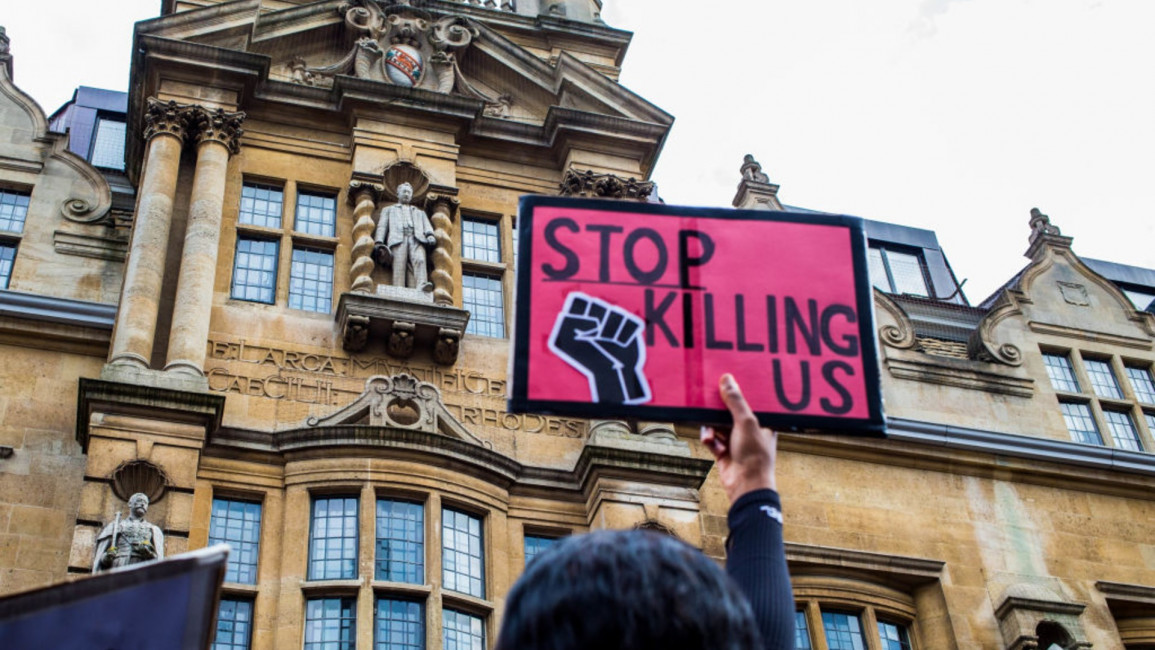
Reparations for slavery should be just the beginning
A powerful symbol of this process has been the international wave of toppling statues of slave owners, colonial officers and other mass murders. Across the world, thousands of activists have echoed the protestors in Bristol who toppled Edward Colston's statue and threw him in the waters of the dock where his slave-baring ships used to load and unload their enchained cargo.
Leopold the Second in Belgium, several Christopher Columbus statues in the states, and now many others followed. Even Oxford colleges, after years of resisting popular demand to remove Cecil Rhodes' effigy from Oriel College, have yielded under pressure.
Of course this is not (only) a debate about history and the deeply troubling ease with which our institutions continue to honour men who enslaved, murdered, and displaced millions, dispossessing, plundering and exploiting as they went, amassing huge amounts of loot in the colonial metropoles.
 |
Racialised violence, the plunder of the Global South, and the exploitation of black and brown working classes continues to be the life blood of the capitalist system |  |
It is just as much about the kind of power structures that continue to underpin our own society. Racialised violence, the plunder of the Global South, and the exploitation of black and brown working classes continues to be the life blood of the capitalist system. It is inscribed in its very DNA.
Today, protesters are standing up against the dehumanization of black people around the world, and the complicity of institutions like the Bank of England in profiting from slavery. They are not only critical that statues of racist figures are still standing, but that their legacies of profiting from enslavement and exploitation are also the foundations of British economy. And the Bank of England is not alone.
The Legacies of British Slave-ownership (LBS) database, set up in 2013, has highlighted the violent and bloody history of slavery and the slave-trade. Importantly the LBS documents and demonstrates how wealth accumulated by slave owners did not end with the official abolition of slavery in the British Empire in 1833.
Indeed, the whitewashed version of events that we are taught in schools, tends to tell us that the cruel practice was over when slaves were emancipated. Yet, the rest of the story, documented in the database, is that of continued profit by the slave owners and traders, well beyond that time, stretching even to the present day.
Millions were distributed from the public purse to "compensate" slave owners for their losses in human property. What's more, a lot of this wealth was used to establish other colonies in Canada, New Zealand and Australia where the indigenous populations were being wiped out.
Twitter Post
|
Furthermore, from sugar plantations in the Caribbean, to tea plantations in India, to cotton in the US, the British emancipation was followed by an intensification of the practices of racialised rule and exploitation around the world. That's to say nothing of the continued practices of illegal slave traders, the thinly veiled continuity between slavery and so-called "apprenticeships" in the Caribbean, that kept formerly enslaved black populations on the plantations. The use of indentured South and East Asian labourers who were often transported and housed in the same boats and shacks that had been used for enslaved populations also increased.
Read more: For the sake of George Floyd and black
lives everywhere, make this moment count
Today, you hardly need to look very far within the ranks of the British elite to find those whose wealth was built off the back of enslaved peoples. Brewer Greene King and insurance firm Lloyds are but a few household name businesses with such roots.
Both have recently announced their commitments to righting some of these wrongs. They offer "regret", championing people of colour by supporting them through recruitment and making donations to charities which work on diversity and inclusion. Hardly an exercise in undoing hundreds of years of destruction and sustaining racialised systems of exploitation and murder.
In this context, it is not surprising that calls for official reparations to the descendants of the enslaved and the colonised by the companies and governments that profited from these historical processes are re-emerging with new vigour.
The argument that racial inequality - rooted in these histories - continues to underpin the system as it exists, is clear for all to see. The overrepresentation of black and Asian people in British jails, in murder statistics at the hands of the police, or in the most insecure and poorly paid jobs, demonstrate this reality all too starkly. Covid-19, by intersecting with these realities, became yet another proof of this structural continuity.
But reparations, while an important aspect of addressing historical wrongs, that has the possibility of redistributing some of the wealth amassed by capital downwards, cannot address hundreds of years of structural inequality, nor wrestle industrial power from the hands of the rich and powerful.
Our economic system is built on inequality, on exploitation, and division both within nation states and internationally. Racism - and the repression and exploitation it normalises and reproduces - is a key tool in keeping that system afloat. In the words of Malcolm X, "You can't have capitalism without racism."
 |
Greater access to some of the stolen wealth can contribute to our struggle but it cannot solve our problems |  |
Our demands then cannot be limited to asking for a fairer share of a poisoned pie. Greater access to some of the stolen wealth can contribute to our struggle but it cannot solve our problems. The horrors that underlie the capitalist system include sweatshops in East and South Asia, the prison industrial complex in North America, and the horrendous conditions of miners across the African continent. They also include mistreatment of migrant workers in the Gulf, and the children and grandchildren of the European Empires' colonial subjects fighting to make a living in the metropoles, built by their ancestors' blood, sweat and tears. None of this will be solved by redistribution.
They can only end when the system that sustains them ceases to exist. This is not a pipe dream but an urgent, pressing precondition for our collective survival. In the face of this, all our demands, all our actions are justified as long as they contribute to the long struggle for liberation.
It was C.L.R James who wrote that "[t]he cruelties of property and privilege are always more ferocious than the revenges of poverty and oppression".
And as I listen to the horrified voices of our rulers, crying over toppling statues, demands for minimal redistribution of wealth, and some broken glass, I can't help but remember those words. Nor can I help smile and think: you haven't seen anything yet.
Malia Bouattia is an activist, a former president of the National Union of Students, and co-founder of the Students not Suspects/Educators not Informants Network.
Follow her on Twitter: @MaliaBouattia
Opinions expressed in this article remain those of the author and do not necessarily represent those of The New Arab, its editorial board or staff.




